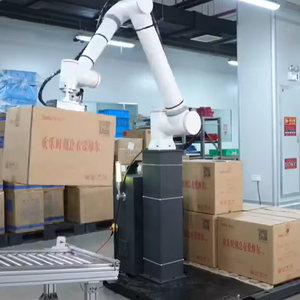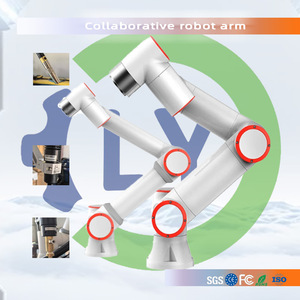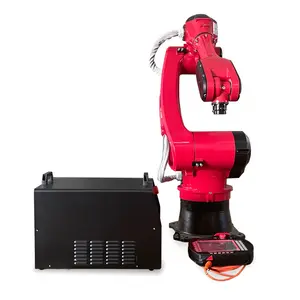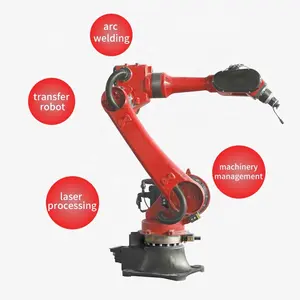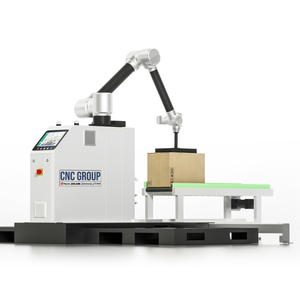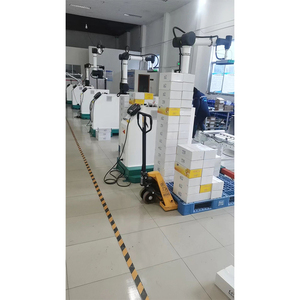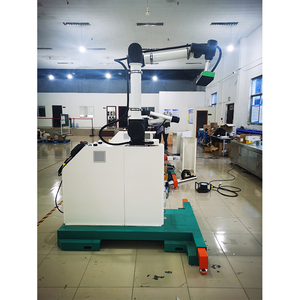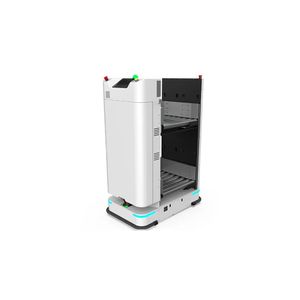Robots In Factories


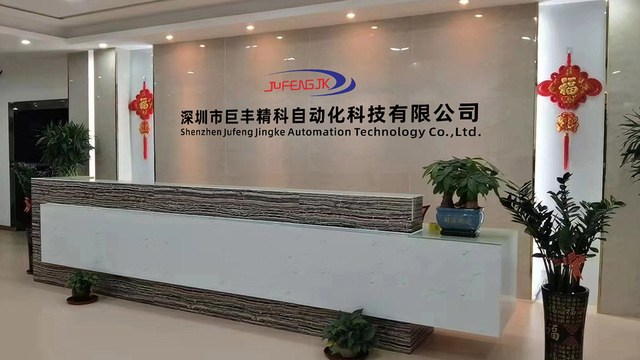





 1/33
1/33








 1/28
1/28







 CN
CN



 1/12
1/12
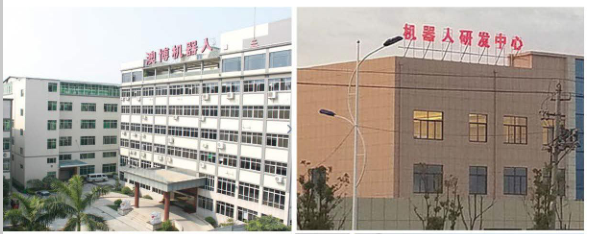
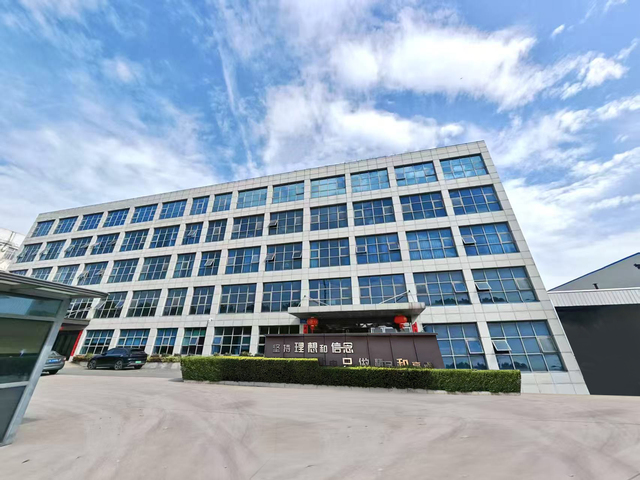


 CN
CN


 1/14
1/14



 1/7
1/7
About robots in factories
Where to Find Robots in Factories Suppliers?
China remains the global epicenter for industrial robotics manufacturing, with key production clusters concentrated in Guangdong, Shenzhen, and Qingdao. These regions host vertically integrated supply chains that support rapid prototyping, scalable assembly, and cost-efficient component sourcing. Guangdong’s Dongguan and Shenzhen zones specialize in precision automation systems, leveraging proximity to semiconductor and electronics manufacturers to produce collaborative robots (cobots), linear actuators, and mobile robotic platforms. Meanwhile, Shandong-based suppliers focus on heavy-duty robotic workstations integrated into welding, palletizing, and automated production lines.
The regional ecosystems enable tight coordination between mechanical engineering firms, servo motor producers, and control system developers—reducing lead times by 20–35% compared to non-specialized markets. Buyers benefit from localized access to CNC machining centers, anodizing facilities, and quality testing labs within a 50-kilometer radius. This integration supports MOQ flexibility—from single-unit R&D prototypes to container-scale orders—while maintaining consistent delivery timelines averaging 30–45 days for standard configurations.
How to Choose Robots in Factories Suppliers?
Procurement decisions should be guided by structured evaluation criteria focused on technical capability, operational reliability, and transactional transparency.
Technical and Production Capability
Assess whether suppliers maintain in-house design, machining, and final assembly operations. Key indicators include dedicated R&D teams, proprietary software interfaces, and ownership of core components such as harmonic drives or linear rails. Prioritize companies offering customization options including stroke length, load capacity, material finish, and communication protocols (e.g., Modbus, EtherCAT). Verified evidence of six-axis articulation, repeatability under ±0.02mm, and IP-rated enclosures indicates higher engineering maturity.
Quality Assurance and Compliance
While formal ISO 9001 certification is not uniformly listed across all suppliers, consistent on-time delivery rates above 97% and response times under 3 hours suggest disciplined internal processes. For deployment in regulated environments (EU, North America), confirm compliance with CE or equivalent safety standards for electrical and mechanical subsystems. Request documentation on motor lifespan testing, gear backlash measurements, and controller stability under continuous operation.
Transaction Risk Mitigation
Utilize secure payment frameworks where funds are held in escrow until post-delivery verification. Analyze reorder rates as a proxy for customer satisfaction—suppliers with reorder rates exceeding 30% demonstrate stronger product reliability and after-sales service. Conduct video audits of factory floors to validate claims about automation level and inventory management. Sample testing is critical: benchmark positioning accuracy, cycle time consistency, and thermal performance before scaling procurement.
What Are the Best Robots in Factories Suppliers?
| Company Name | Location | Main Products | On-Time Delivery | Avg. Response | Reorder Rate | Online Revenue | Key Offerings | Price Range (Min. Order) |
|---|---|---|---|---|---|---|---|---|
| Guangdong Borunte Robot Technology Co., Ltd. | Guangdong, CN | Articulated Robots, Collaborative Robots, Packaging Machines, AGVs | 75% | ≤3h | 50% | US $20,000+ | 6-axis industrial arms, autonomous mobile robots | $1,999–$12,000/set |
| Shenzhen Jufeng Jingke Automation Technology Co., Ltd. | Shenzhen, CN | Linear Robots, Linear Guides, Actuators | 100% | ≤1h | 30% | US $10,000+ | Custom multi-axis linear modules | $60–$1,900/piece |
| Dongguan Xiji Intelligent Technology Co., Ltd. | Dongguan, CN | Linear Robots, Guide Rails, Sliding Tracks | 100% | ≤1h | - | US $10,000+ | Robot guide rails, ground sliding tracks | $370–$2,200/piece |
| Jinan Lingyu International Trade Co., Ltd. | Shandong, CN | CNC Robots, Welding Arms | 100% | ≤1h | <15% | US $40,000+ | 6-axis magnetic welding robots | $5,450–$14,900/set/bag |
| Stuaa Automation (Qingdao) Co., Ltd. | Qingdao, CN | Welding Robots, Automated Production Lines | 100% | ≤6h | - | - | Full robotic welding stations | $78,548–$314,200/set |
Performance Analysis
Suppliers like Shenzhen Jufeng Jingke and Dongguan Xiji stand out for exceptional responsiveness (≤1h average reply time) and perfect on-time delivery records, making them suitable for time-sensitive integration projects. Guangdong Borunte distinguishes itself with a high reorder rate of 50%, indicating strong end-user satisfaction across articulated and mobile robot models. In contrast, Stuaa Automation targets large-scale industrial clients with fully automated welding lines priced above $78,000, reflecting specialization in capital-intensive turnkey solutions. Jinan Lingyu demonstrates robust export volume (US $40,000+ online revenue) but a low reorder rate (<15%), suggesting reliance on one-off or distributor-driven sales rather than repeat enterprise contracts.
FAQs
How to verify robots in factories supplier reliability?
Cross-check self-reported metrics with transaction history, customer reviews, and response consistency. Demand proof of functional testing—including motion trajectory videos and load endurance reports. Evaluate technical support depth by requesting firmware update logs and error-handling documentation.
What is the typical sampling timeline for industrial robots?
Standard robotic arms or linear modules require 10–20 days for sample preparation. Custom-stroke actuators or modified end-effectors may extend to 30 days. Add 5–12 days for international air freight depending on destination region.
Can suppliers provide robots compliant with international safety standards?
Yes, many manufacturers design to CE-compliant electrical architectures and offer optional safety-rated controllers. Confirm inclusion of dual-channel emergency stops, safe torque off (STO) functionality, and risk assessment documentation prior to purchase.
Do robotics suppliers support OEM/ODM customization?
Extensive customization is available, including color, branding, cable routing, communication interface, and structural dimensions. Suppliers such as Jinan Lingyu explicitly list logo, packaging, and graphic labeling options, enabling white-label deployment for integrators and distributors.
What are common MOQ and pricing structures?
Most suppliers set MOQ at 1 unit for evaluation purposes. Unit pricing varies significantly by payload and complexity: entry-level linear actuators start at $60/unit, while full 6-axis robotic cells range from $5,000 to over $14,000. High-end automated welding lines exceed $78,000 per station due to integration of positioners, wire feeders, and safety enclosures.



